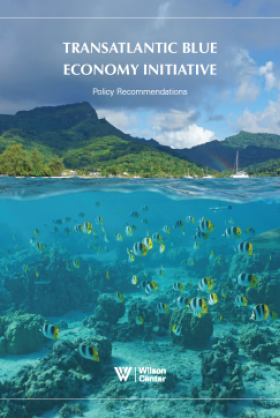Transatlantic Blue Economy Initiative - Policy Recommendations


Sustainable management of ocean resources requires collaboration across nation-states and
across the public-private sectors. In the United States as well as in the European Union (EU),
the governments have started to implement Blue Economy programs on the national, regional,
and local level. The challenges vary in each country, and there are different tools needed for
maritime industries such as fisheries, transport, and tourism.
The Konrad-Adenauer-Stiftung USA (KAS) and the Wilson Center’s Global Europe Program partner and propose the creation of a joint “Transatlantic Blue Economy Initiative” that would enable key decision-makers and policymakers in the United States and the EU to collaborate and work on concrete initiatives by sharing best practices as well as lessons learned from Blue Economy policies. The following policy briefs compiled in a comprehensive report provide a roadmap and scope for strengthening the Blue Economy on both sides of the Atlantic.
This report was made possible by support from the Konrad-Adenauer-Stiftung. The views, conclusions and recommendations expressed in this report are solely those of its author(s) and do not reflect the views of the Konrad-Adenauer-Stiftung, or its employees.
Authors









Global Europe Program
The Global Europe Program is focused on Europe’s capabilities, and how it engages on critical global issues. We investigate European approaches to critical global issues. We examine Europe’s relations with Russia and Eurasia, China and the Indo-Pacific, the Middle East and Africa. Our initiatives include “Ukraine in Europe”—an examination of what it will take to make Ukraine’s European future a reality. But we also examine the role of NATO, the European Union and the OSCE, Europe’s energy security, transatlantic trade disputes, and challenges to democracy. The Global Europe Program’s staff, scholars-in-residence, and Global Fellows participate in seminars, policy study groups, and international conferences to provide analytical recommendations to policy makers and the media. Read more






